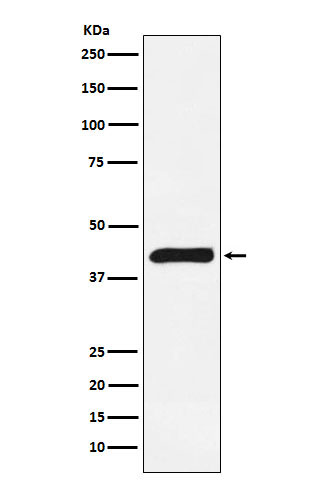ALKBH1 Antibody
Rabbit mAb
- 产品详情
- 实验流程
Application
| WB, IHC |
|---|---|
| Primary Accession | Q13686 |
| Reactivity | Human, Mouse |
| Clonality | Monoclonal |
| Other Names | ABH; ABH1; alkB; ALKBH; ALKBH1; hABH; |
| Isotype | Rabbit IgG |
| Host | Rabbit |
| Calculated MW | 43832 Da |
| Dilution | WB 1:500~1:2000 IHC 1:50~1:200 |
|---|---|
| Purification | Affinity-chromatography |
| Immunogen | A synthesized peptide derived from ALKBH1 |
| Description | Dioxygenase that repairs alkylated single-stranded DNA and RNA containing 3-methylcytosine by oxidative demethylation. Requires molecular oxygen, alpha-ketoglutarate and iron. |
| Storage Condition and Buffer | Rabbit IgG in phosphate buffered saline , pH 7.4, 150mM NaCl, 0.02% sodium azide and 50% glycerol. Store at +4°C short term. Store at -20°C long term. Avoid freeze / thaw cycle. |
| Name | ALKBH1 (HGNC:17911) |
|---|---|
| Function | Dioxygenase that acts on nucleic acids, such as DNA and tRNA (PubMed:18603530, PubMed:27497299, PubMed:27745969). Requires molecular oxygen, alpha-ketoglutarate and iron (PubMed:18603530, PubMed:27497299). A number of activities have been described for this dioxygenase, but recent results suggest that it mainly acts on tRNAs and mediates their demethylation or oxidation depending on the context and subcellular compartment (PubMed:27497299, PubMed:27745969). Mainly acts as a tRNA demethylase by removing N(1)-methyladenine from various tRNAs, with a preference for N(1)-methyladenine at position 58 (m1A58) present on a stem loop structure of tRNAs (PubMed:27745969). Acts as a regulator of translation initiation and elongation in response to glucose deprivation: regulates both translation initiation, by mediating demethylation of tRNA(Met), and translation elongation, N(1)- methyladenine-containing tRNAs being preferentially recruited to polysomes to promote translation elongation (PubMed:27745969). In mitochondrion, specifically interacts with mt-tRNA(Met) and mediates oxidation of mt-tRNA(Met) methylated at cytosine(34) to form 5- formylcytosine (f(5)c) at this position (PubMed:27497299). mt-tRNA(Met) containing the f(5)c modification at the wobble position enables recognition of the AUA codon in addition to the AUG codon, expanding codon recognition in mitochondrial translation (PubMed:27497299). Specifically demethylates DNA methylated on the 6th position of adenine (N(6)-methyladenosine) DNA (PubMed:30017583, PubMed:30392959). N(6)- methyladenosine (m6A) DNA is present at some L1 elements in embryonic stem cells and probably promotes their silencing (By similarity). Demethylates mRNAs containing N(3)-methylcytidine modification (PubMed:31188562). Also able to repair alkylated single-stranded DNA by oxidative demethylation, but with low activity (PubMed:18603530). Also has DNA lyase activity and introduces double-stranded breaks at abasic sites: cleaves both single-stranded DNA and double-stranded DNA at abasic sites, with the greatest activity towards double-stranded DNA with two abasic sites (PubMed:19959401). DNA lyase activity does not require alpha-ketoglutarate and iron and leads to the formation of an irreversible covalent protein-DNA adduct with the 5' DNA product (PubMed:19959401, PubMed:23577621). DNA lyase activity is not required during base excision repair and class switch recombination of the immunoglobulin heavy chain during B lymphocyte activation. May play a role in placental trophoblast lineage differentiation (By similarity). |
| Cellular Location | Nucleus. Mitochondrion. Note=Mainly localizes in euchromatin, largely excluded from heterochromatin and nucleoli (By similarity). {ECO:0000250|UniProtKB:P0CB42} |
| Tissue Location | Ubiquitous. |
Research Areas
For Research Use Only. Not For Use In Diagnostic Procedures.
Application Protocols
Provided below are standard protocols that you may find useful for product applications.
终于等到您。ABCEPTA(百远生物)抗体产品。
点击下方“我要评价 ”按钮提交您的反馈信息,您的反馈和评价是我们最宝贵的财富之一,
我们将在1-3个工作日内处理您的反馈信息。
如有疑问,联系:0512-88856768 tech-china@abcepta.com.
¥ 1,500.00
Cat# AP92672























 癌症的基本特征包括细胞增殖、血管生成、迁移、凋亡逃避机制和细胞永生等。找到癌症发生过程中这些通路的关键标记物和对应的抗体用于检测至关重要。
癌症的基本特征包括细胞增殖、血管生成、迁移、凋亡逃避机制和细胞永生等。找到癌症发生过程中这些通路的关键标记物和对应的抗体用于检测至关重要。 为您推荐一个泛素化位点预测神器——泛素化分析工具,可以为您的蛋白的泛素化位点作出预测和评分。
为您推荐一个泛素化位点预测神器——泛素化分析工具,可以为您的蛋白的泛素化位点作出预测和评分。 细胞自噬受体图形绘图工具为你的蛋白的细胞受体结合位点作出预测和评分,识别结合到自噬通路中的蛋白是非常重要的,便于让我们理解自噬在正常生理、病理过程中的作用,如发育、细胞分化、神经退化性疾病、压力条件下、感染和癌症。
细胞自噬受体图形绘图工具为你的蛋白的细胞受体结合位点作出预测和评分,识别结合到自噬通路中的蛋白是非常重要的,便于让我们理解自噬在正常生理、病理过程中的作用,如发育、细胞分化、神经退化性疾病、压力条件下、感染和癌症。






